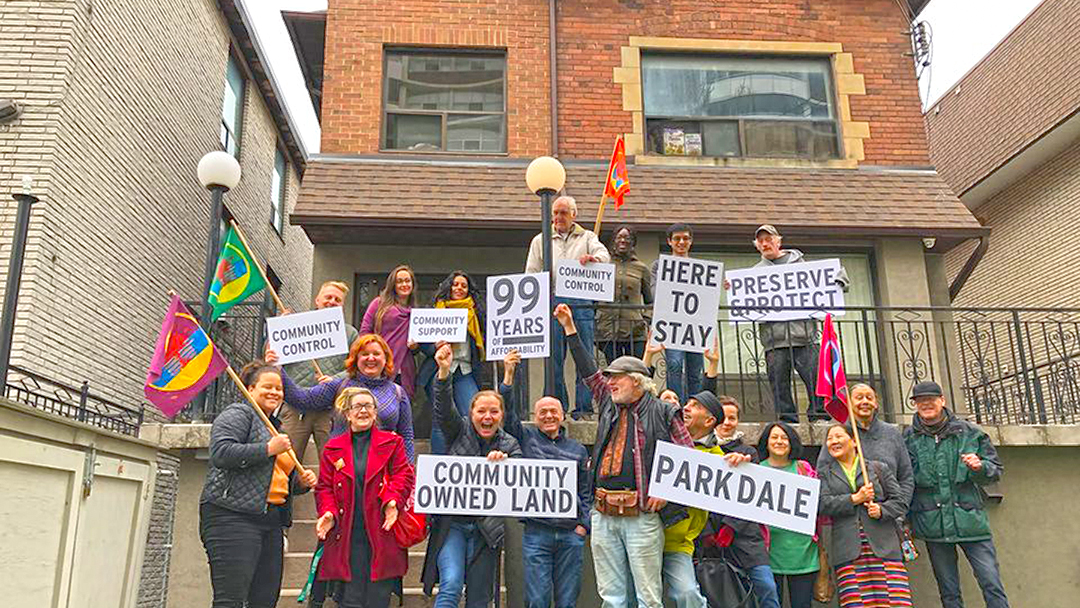The Parkdale neighbourhood in Toronto is the focus of action-oriented research into changes in the rental market over the past few years. Rent increases, changes in building owners, shifts in the mix of tenants: the project seeks to record the experiences of residents through stories and data in order to come up with solutions from the community.
“I can’t speak highly enough of Parkdale,” says Alykhan Pabani, one of the researchers for the Community Action Research Project on Tower Rentals in Parkdale, piloted by the Parkdale Neighbourhood Land Trust. But the district—which has long welcomed students, immigrants, artists, or working-class people, and whose population is very heavily tenant—has changed dramatically in recent years.
“I saw a radical change in the profile of the tenants in the building where I live. They generally seem more affluent. There are less families, [more] single people and couples and stuff like that. And far fewer nonwhite people are moving into the neighbourhood,” says Pabani, who has lived in Parkdale for the past decade.
Rent has skyrocketed. If he were to move today to an apartment identical to his own in the same building, Pabani says he would pay almost double. The type of businesses established in the neighbourhood has also changed significantly. There are more chains, fewer small local stores reflecting the diversity of the community, which is popularly known as “Little Tibet.”
This area of Toronto has been the talk of the town for a while now. Located 6 kilometres west of downtown—just east of High Park, between Roncesvalles Avenue and Dufferin Street, sandwiched between Lake Ontario and the railway—its gentrification has even attracted international attention, with a report in the British daily, The Guardian, in early 2020.
The Parkdale portrait is atypical. According to the 2016 Canadian census, 86.6% of households in the South Parkdale district are renters, compared to a Toronto average of 47.2%. Almost two-thirds of households are in apartment towers of at least five storeys, and half of households spend more than 30% of their income on rent (vs. 37% of Toronto households).
In 2017, Parkdale tenants, including Pabani, went on a rent strike to denounce staggering rent increases demanded by some local landlords, which are large real-estate corporations. The citizen rebellion had a modest effect and some of the owners finally backed down.
But the battle didn’t end end there. The number of affordable housing units in the neighbourhood continues to decline. And a Wellesley Institute study published in August 2020 shows that the number of application to evict tenants here is among the highest in the city.
More vulnerable families and seniors
The Parkdale Neighbourhood Land Trust, which works to protect the area’s social, cultural and economic diversity by focusing on land use and development, wanted to find a response to these changes, which particularly affect families struggling to find suitable housing and seniors, who are very vulnerable to the vagaries of the rental market.
“This research was born as a first step in developing community-driven solutions,” explains Tendon Dongtotsang, who is coordinating the project. According to Dongtotsang, the new project is based on a previous Land Trust study started in 2016, which focused on rooming houses in the area.
The 2016 study got things moving. After the study, the city of Toronto passed Amendment 453 to its development plan to include protections for the city’s rooming houses. The Trust also acquired a rooming house itself to guarantee it stayed affordable.
Accessibility and community involvement
The current project involves the community at different stages. Its focus is on residential hi-rises and seeks to document their evolution and that of the tenant by zeroing in on rent hikes, ownership changes and tenant profiles.
An analysis of Parkdale’s private rental market is one phase of the project and will be conducted by Martine August of the University of Waterloo and Scott Leon of the Wellesley Institute (two researchers who themselves live in Parkdale). In another phase, Parkdale residents who don’t have professional research experience but are interested in housing issues and have been involved in local activism will conduct community-based research. Alykhan is one of those researchers.
The project received a $48,408 grant from the Centre under its Community-Based Tenant Initiative Fund.
Already, a survey designed by and for the community has reached 212 tenants, more than the organizers targeted. Door-to-door canvassing wasn’t possible due to Covid-19, but the project team had more than one trick in their bag: they conducted interviews over the Internet, by phone and via paper surveys. To boost accessibility, the surveys were also conducted in Tibetan, Hungarian and Tagalog, the common language of many Filipinos.
The team must now examine an analysis of the results and organize round tables within the community to identify ways to address the problems and needs identified in the study. Proposals for solutions will come in three forms: policy recommendations, the development of community-based pilot projects and the creation of a social housing model adapted to Parkdale’s situation.
For Dongtotsang, community-based research is useful for observing systemic problems. “But we also need neighbourhood strategies and policy tools to guide change towards healthy, inclusive, and just outcomes for Parkdale’s many smaller communities.”
She believes that the diversity, affordability and inclusiveness of the neighbourhood are threatened by gentrification. “While change is a constant, who benefits from change, and how change happens, must be interrogated and contested in our everyday work and conversations. My hope is that people in Parkdale continue to inspire and protect each other and think of the community as an extension of their own family.”



